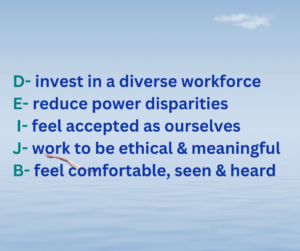
DEIJB stands for Diversity, Equity, Inclusion, Justice, and Belonging.
- Diversity refers to the variety of human experiences, perspectives, and identities that exist within an organization. This includes things like race, ethnicity, gender, sexual orientation, socioeconomic status, religion, and disability.
- Equity refers to the fair and just distribution of resources, opportunities, and outcomes. This means that everyone has the same chance to succeed, regardless of their background or identity.
- Inclusion refers to the act of creating an environment where everyone feels welcome, respected, and valued. This means creating an environment where everyone feels like they belong and can contribute their unique talents and perspectives.
- Justice refers to the fair and impartial administration of law. This means that everyone is treated equally under the law, regardless of their background or identity.
- Belonging refers to the feeling of being accepted and valued for who you are. This means feeling like you are part of a community and that you have a place where you can belong.
What is DEIJB?
It is a framework that organizations can use to create a more inclusive and just workplace. DEIJB is not just about hiring a diverse workforce. It is about creating an environment where all employees feel welcome, respected, and valued, regardless of their background or identity.
Why is DEIJB important?
First, it is simply the right thing to do. All people deserve to be treated with dignity and respect, regardless of their background or identity.
Second, DEIJB can lead to better business outcomes. Studies have shown that companies with more diverse workforces are more innovative, more profitable, and better able to attract and retain top talent.
Third, DEIJB is good for society as a whole. When everyone feels like they belong, it creates a more just and equitable world.

What are the benefits of DEIJB?
There are many benefits to DEIJB, including:
- Increased innovation: Diverse teams are more likely to come up with new and creative ideas.
- Improved decision-making: Diverse teams are better able to consider all sides of an issue and make decisions that are in the best interests of the organization.
- Increased productivity: Employees who feel valued and respected are more likely to be engaged and productive.
- Reduced turnover: Employees who feel like they belong are more likely to stay with an organization.
- Enhanced reputation: Organizations that are seen as being inclusive and just are more likely to attract top talent and customers.

How can organizations implement DEIJB?
There are many ways that organizations can implement DEIJB. Here are a few tips:
- Start with a commitment from the top. DEIJB cannot be successful without the support of senior leadership. The CEO and other leaders need to be clear about their commitment to DEIJB and make sure that it is reflected in the organization’s mission, values, and policies.
- Create a diversity and inclusion council. A diversity and inclusion council is a group of employees who are responsible for developing and implementing DEIJB initiatives. The council should be made up of representatives from all levels and functions of the organization.
- Set goals and track progress. Organizations need to set specific goals for DEIJB and track their progress over time. This will help to ensure that DEIJB is a priority and that the organization is making progress.
- Provide training and education. Employees need to be trained on the importance of DEIJB and how to create a more inclusive workplace. Training should cover topics such as unconscious bias, microaggressions, and allyship.
- Create a culture of belonging. DEIJB is not just about hiring a diverse workforce. It is about creating an environment where all employees feel welcome, respected, and valued. This means creating a culture where employees feel comfortable being themselves and speaking up.
Conclusion
DEIJB is an important framework because it helps organizations to create a more inclusive and just workplace. By focusing on diversity, equity, inclusion, justice, and belonging, organizations can create an environment where everyone feels welcome, respected, and valued. This can lead to a number of benefits, including increased innovation, improved decision-making, increased productivity, reduced turnover, and enhanced reputation.